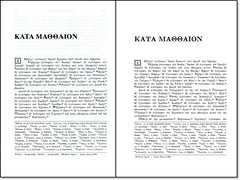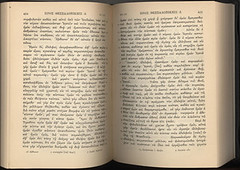Gentle reader,
To understand something requires that we do something . In the case of the Gospels it requires that we put down our rose colored glasses and look again at what we we have before us. And then stop and think (I know that is hard especially when so many let others think for them) But Gentle reader, I want you to sit back inhale the delicious aroma of my Irish coffee and think for a moment or two.
Now then if we would remove that pesky page in out bible which says "The New Testament" we could actually have a complete or at least better understanding of how we came to what we call "the New testament"
When the last book of the Hebrew Bible was penned there was period of approximately400 years which we call the inter-Testament period. A period from Malachi (374 B.C.) To Matthew. A interval in which has been called "the dark period" where there was neither prophet nor inspired writer . A period in which Israel history in pro Christian times as was declared in Psalm 74: <Maschil of Asaph.> O God, why hast thou cast us off for ever? why doth thine anger smoke against the sheep of thy pasture? Remember thy congregation, which thou hast purchased of old; the rod of thine inheritance, which thou hast redeemed; this mount Zion, wherein thou hast dwelt. Lift up thy feet unto the perpetual desolations; even all that the enemy hath done wickedly in the sanctuary. Thine enemies roar in the midst of thy congregations; they set up their ensigns for signs. A man was famous according as he had lifted up axes upon the thick trees. But now they break down the carved work thereof at once with axes and hammers. They have cast fire into thy sanctuary, they have defiled by casting down the dwelling place of thy name to the ground. They said in their hearts, Let us destroy them together: they have burned up all the synagogues of God in the land. We see not our signs: there is no more any prophet: neither is there among us any that knoweth how long. (Psa 74:1-9)m What we had at the end of The "Hebrew Bible and the Book of Malachi in its four successive compartments, (i.e.) The Organizational, the Historical, the Philosophical, the Prophetical, is a book of 1) UNEXPLAINED CEREMONIES, 2) UNACHIEVED PURPOSES, 3)UNAPPEASED LONGINGS, 4) UNFILLED PROPHECIES. UNTIL WE COME TO THE "New Testament".
I like to tell my study groups when we turn to what has been called the "new testament or the new covenant" to turn to for example Matthew in their old testament which strictly speak is true!
We have looked the first few studies at an abbreviated form of her·me·neu·tics which is ( the branch of theology that deals with the principles of Biblical exegesis.) That is to say the science of interpretation - which most feel that they have that principle locked down.... much to my dismay!! Unfortunately everyone who has heard a message (sermon to my American friends) feels that it’s a simple thing "just get up and read a verse of Scripture and then tell people what you think about something else. It was in the Book of Hosea that we read " My people are destroyed for lack of knowledge: because thou hast rejected knowledge, I will also reject thee, that thou shalt be no priest to me: seeing thou hast forgotten the law of thy God, I will also forget thy children. (4:6) I suppose that if I have a hobby horse it is the unlearned teaching the unwilling to be unrighteous. To be ignorant is a dangerous thing Gentle reader, but I have hopes that in you we shall turn the ignorance of many into the wisdom for it has been written we have the "mind of Christ" 1Co 2:16 For who hath known the mind of the Lord, that he may instruct him? But we have the mind of Christ.
So allow me to share with you some insights garnered through years of thinking about what we have all read. When one first reads the 4 gospels one finds a structure that is unmistakable, We find for example in the Book of Matthew a structure that looks like this:
A. The Proclamation of the Kingdom (Matt. 4:12-7:29 )
B. The Proclamation of the King (Matt. 8:1-16:20 )
B. The Rejection of the King (Matt.16:20-20:34)
A. The Rejection of the Kingdom (Matt. 21:1-26:35 )
But we want to move past all of that to consider, this that the writers of the 4 Gospels were living in a time when they were not thinking WWJS (What would Jesus Say? If He were present) But what was Jesus saying! Because He was present!
This was not a later development but from the very beginning those who embraced the Messiah were absolutely convinced that He was there with them it was settled from the very earliest time. Paul appealed to these believers by these words: For as the body is one, and hath many members, and all the members of that one body, being many, are one body: so also is Christ. For by one Spirit are we all baptized into one body, whether we be Jews or Gentiles, whether we be bond or free; and have been all made to drink into one Spirit. For the body is not one member, but many. (1Co 12:12-14) You are Messiah’s body, each with a function. This belief was asserted in the earliest baptismal hymn that Paul quotes: For ye are all the children of God by faith in Christ Jesus. For as many of you as have been baptized into Christ have put on Christ. There is neither Jew nor Greek, there is neither bond nor free, there is neither male nor female: for ye are all one in Christ Jesus.
(Gal 3:26-28 ) . So given this sense of Jesus indwelling in the community its members did not ask (as we struggle with today) what would Jesus be saying. They knew!
So as we look at these gospels we will see Jesus in persecution in Mark Jesus in instruction in Matthew, Jesus in consolation in Luke and in mystical exaltation in John. Which we will take up in turn next time. Remember we are looking at the first believers and their understanding of the marching orders of Christ. How exciting is that?
Love,





No comments:
Post a Comment